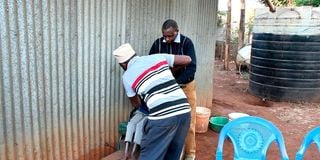Why northern counties have high prevalence of birth defects

Mr Dika Guyo (left) attends to his eleven-year-old son, who lives with a disabilty, at Shauri Yako in Marsabit town. He is being helped by Godana Doti, a physiotherapist.
What you need to know:
- Experts note that although not all birth defects can be avoided, prenatal care and awareness of past or current conditions can help with prevention.
- They attribute the high prevalence of birth defects among the pastoralist communities in Marsabit and other northern counties to high levels of illiteracy, environmental factors such as persistent droughts that often cause acute food insecurity and malnutrition, poor nutrition and poor maternal health-seeking behaviours, especially among the rural women who still largely rely on traditional midwifery services.
When Mr Dika Guyo, 59, and his wife welcomed their newborn in 2013, it was a time of joy and celebration.
But the joy was short-lived when the baby started falling ill.
At the age of six months, Baby Roba was diagnosed with a chronic orthopaedical infection, which consequently rendered his limbs permanently immobile.
The condition progressively resulted in the shrinking and withering of Baby Roba’s limbs, learning difficulties and bladder and bowel challenges.
Mr Guyo, a resident of Shauri Yako in Marsabit town, notes that as the disease took a toll on the baby, his wife sunk into depression and was unable to do her daily chores and fend for her seven children.
He says knowing that his son, now aged 11 years, has a lifelong disability, makes him sad. “Nothing is harder than watching your child suffer and realising that they will live with a disability forever and you can't do anything about it. It’s extremely hard to accept,” he says.
Mr Guyo’s hopes of seeing his son get better faded when doctors at Kijabe Mission Hospital and Kenyatta National Hospital confirmed that the condition was irreversible.
A similar predicament is shared by Tume Ibrahim and Ali Ibrahim , residents of Marsabit Old Town.
Their son, Ibrahim, was born with a birth defect. Mr Godana Doti, the physiotherapist who has been handling Ibrahim, explains that he was born with a neural defect known as spina bifida, which occurs when the spine and spinal cord do not form properly.
He notes that not having enough folic acid during pregnancy is one of the factors that can increase chances of having a child with spina bifida.
At the age of 10, Ibrahim still wears diapers and has undergone several minor surgeries to correct the paralysis.
Ibrahim and Roba represent many children with disabilities in northern counties like Marsabit, which have continued to record rising numbers of congenital abnormalities.
Mary Karedan, the Sister in charge of Fatima Home for physically challenged children, says the institution, which opened its doors in 2008, is currently taking care of 30 children.
She says children suffering from congenital anomalies are hidden in their homes by their parents to avoid stigma from society.
The children at Fatima Home come from Sololo, Songa Badasa, Kargi, Namarei, Kamboe, Goro Rukesa, Saku, Karare and Moyale. Most of these areas are far-flung and are away from Marsabit County Referral Hospital, which provides comprehensive maternal health care for women in the region.
Some of the children have clubfoot, a congenital foot deformity that affects a child's bones, muscles, tendons and blood vessels.
Some cases are corrected when they are taken to hospital at an early stage.
Mary says cultural practices that discriminate or stigmatise children born with disabilities are deep-rooted in the region.
“Some children are left to die when their parents discover they have congenital anomalies,” she says.
Mr Doti notes that although not all birth defects can be avoided, prenatal care and awareness of past or current conditions can help with prevention.
He attributes the high prevalence of birth defects among the pastoralist communities in Marsabit and other northern counties to high levels of illiteracy, environmental factors such as persistent droughts that often cause acute food insecurity and malnutrition, poor nutrition and poor maternal health-seeking behaviours, especially among the rural women who still largely rely on traditional midwifery services.
“If pregnant mothers visit health facilities in good time, we can avert many cases of congenital anomalies,” Dr Doti notes.
The World Health Organization recommends a minimum of eight antenatal clinic visits, including the first contact as soon as pregnancy is suspected.
Early initiation of the antenatal clinic allows early detection and management of pregnancy-related complications.
Dr Doti notes that in 2023, Marsabit Central alone had more than 17 children with congenital anomalies who were hidden by their parents for fear of stigma.
Several other studies have shown that northern Kenya counties experience relatively high rates of stillbirths and congenital disorders compared to the national figure due to poor health-seeking behaviour among mothers and preference for traditional medication by locals.
Marsabit County has now sponsored the Community Health Policy and Bill, 2022, which seeks to improve healthcare services, enhance disaster mitigation and improve the socio-economic status of residents.
Marsabit Governor Mohammud Ali says his administration is committed to the realisation of universal health coverage (UHC), noting that at least 29 per cent of the county's budget has been allocated to the sector.
"My administration has prioritised substantial investment in the health sector aiming to improve access to quality healthcare for our people," says Governor Ali.
He notes that the Community Health Promoters program will be prioritised in line with advancing UHC.
The county’s Health department's latest estimate on maternal mortality ratio is 1,127 deaths per 100,000 live births.
According to the African Institute for Development Policy study of 2017 and the Demographic and Health Survey Report 2022 conducted by the Kenya National Bureau of Statistics, Marsabit was flagged among the counties with the highest birth rates.
The reports indicated that the county’s fertility rate was five times higher than the national rate of 3.9, a factor attributed to barriers to modern contraceptive methods uptake among women.
Currently, the rate of maternal mortality in Kenya, according to the Ministry of Health, stands at 19.7 per 1,000 births.
A study done in 2021 based on the Demographic and Health Surveys of 12 East African countries established that stillbirth and birth defects are some of the frequently reported pregnancy outcomes in the region. The study showed that East African countries account for one-third of the 2.6 million stillbirths globally.





